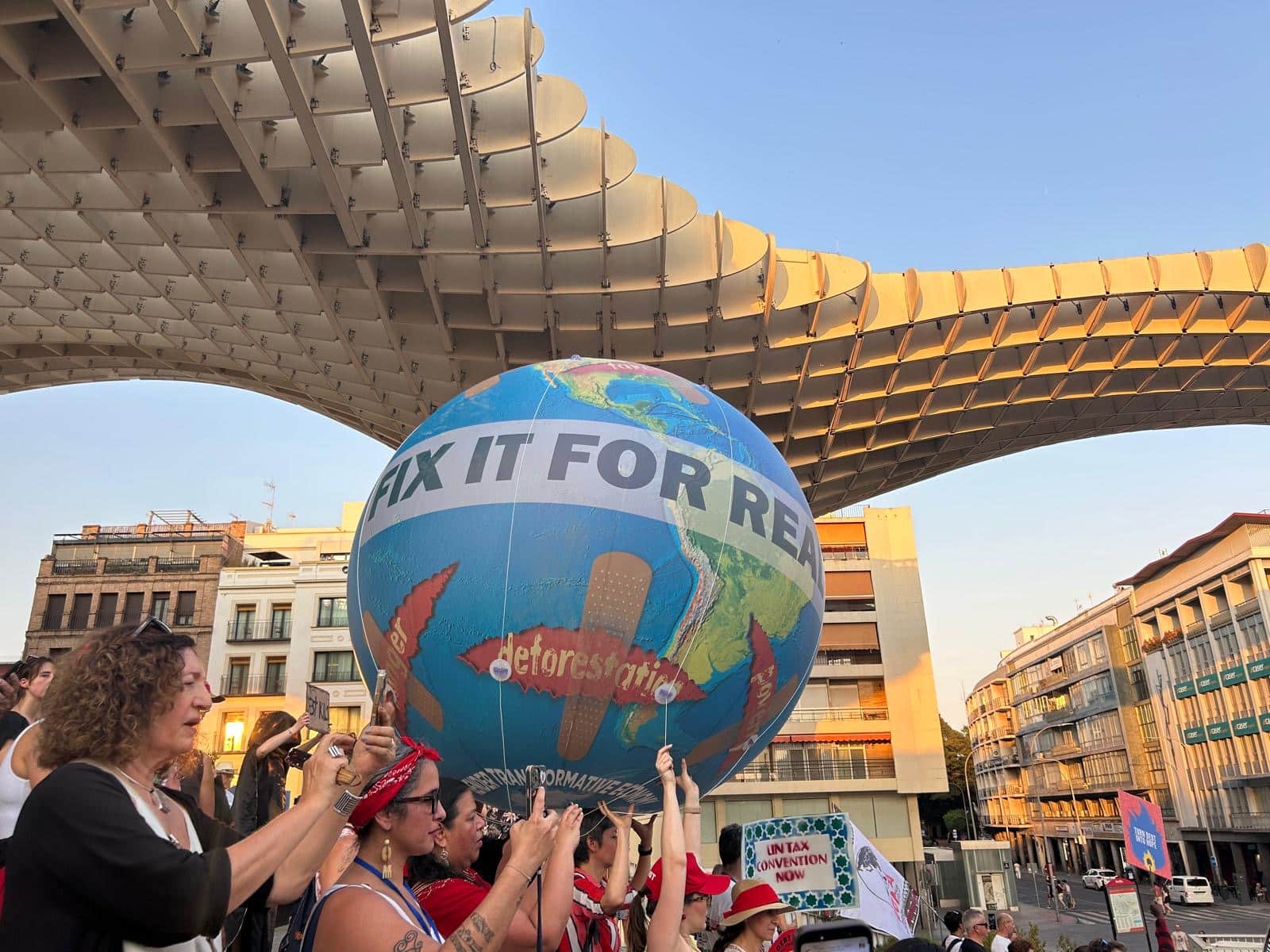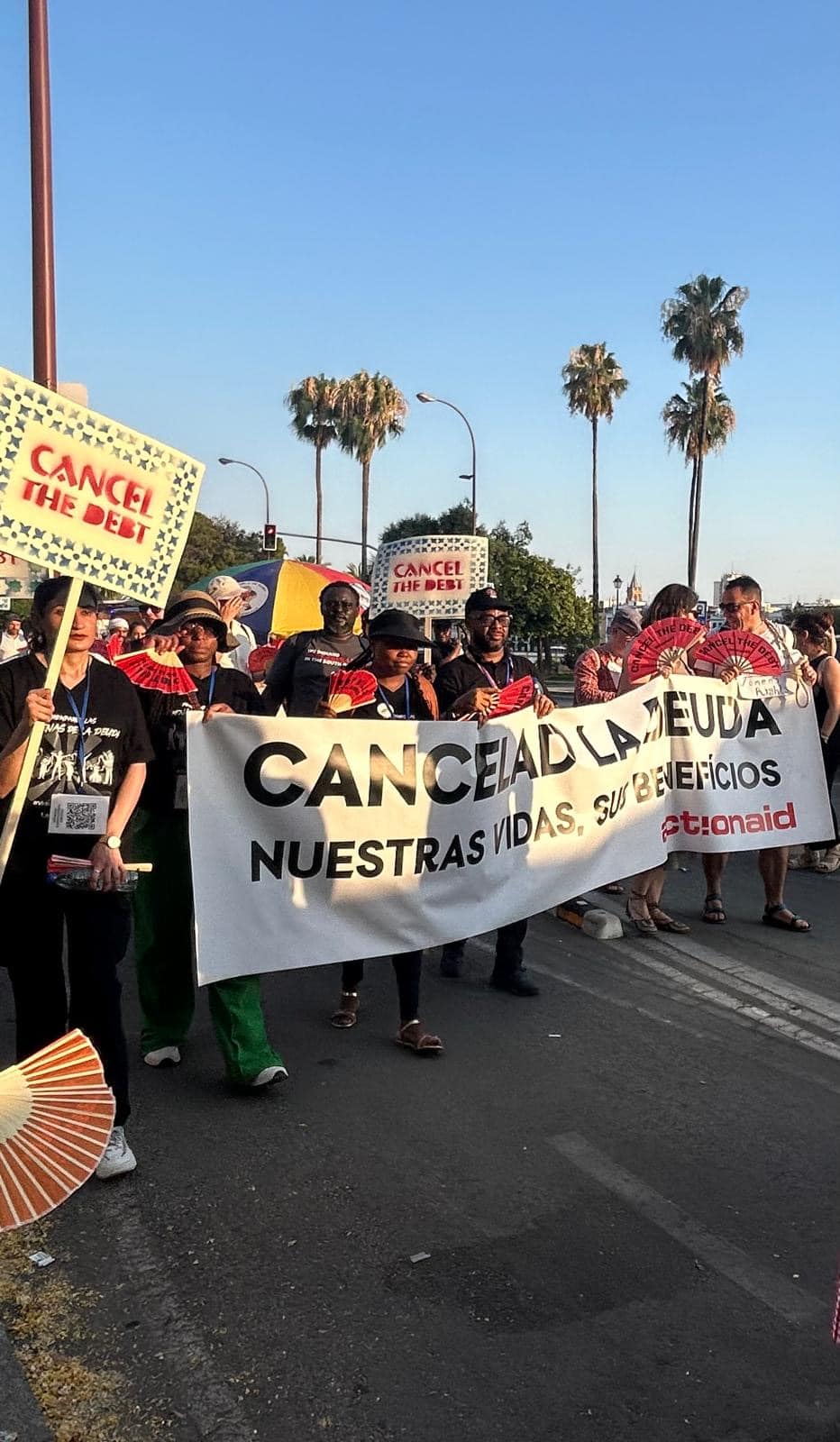
Leaving No One Behind?: the Heated Landscape of Financing for Development
by Jeff Conant, senior international forests program manager
In the blistering Spanish sun on the first day of the Fourth International United Nations Conference on Financing for Development (FF4D), its 110 degrees fahrenheit (43 celsius), making this global forum a de facto tribunal on the climate emergency. Policymakers, bankers, economists and development justice advocates from every country are here to debate the way forward for sustainable development. As in virtually every other multilateral forum, from the UNFCCC Climate negotiations to the Convention on Biological Diversity, the way forward is fraught by polarization, inequality, corporate capture, and political crisis.
I’m here at the FF4D with a team from the Forests and Finance Coalition where we tackle the root causes of global deforestation and forest degradation by fighting for improved financial sector transparency, policies and regulations. With over a decade of experience demanding action from the financial actors that bank on biodiversity collapse, we’re in the sun-baked Andalusian capital of Seville to expose the broken financial architecture that drives countries around the world to sacrifice both nature and culture to the brutal demands of extractive finance.
In the notable absence of the United States – which has formally abandoned any pretense to supporting the Sustainable Development Goals – negotiators have already hammered out an outcome document, tellingly known as “the Compromise of Seville.” (To be fair, “compromise” in Spanish means both “compromise” and “commitment.”) “We reaffirm our commitment to realize sustainable development,” the outcome document begins, “including effectively implementing the 2030 Agenda for Sustainable Development and its 17 Sustainable Development Goals and upholding all principles enshrined in it. We also reaffirm that poverty in all its forms and dimensions, including extreme poverty, remains the greatest global challenge and its eradication is an indispensable requirement for sustainable development. We recommit to end poverty and hunger everywhere, leaving no one behind.”
It is a noble aim – and one that the Compromise of Seville is sadly unfit to deliver.
The night before the forum’s opening, at the closing of the Civil Society Forum on the Financing For Development Conference, United Nations Under Secretary-General Amina Mohammed told a gathering of civil society movements, “Development is not just a matter of capital flows and balance sheets – it is about justice and equity. The Compromise of Seville does not meet the level of ambition necessary. The international financial architecture is not fit for purpose. In five years we will reach the end of the term of the Sustainable Development Goals – yet we are still decades away from reaching the goals of that commitment.” Most tellingly, perhaps, Under Secretary Mohammed called out the structural weakness of the multilateral system: “In times like this, international consensus means accepting the lowest common denominator.”

Undoubtedly the Seville Compromise is filled with promising language – “We decide to launch an ambitious package of reforms and actions to close this financing gap with urgency and catalyse sustainable development investments at scale;” “We will place people at the centre of all our actions and reaffirm the path to a brighter future for all of humanity;” “We recognize that discrimination in all its forms is a serious impediment to economic and social development.” But throughout the 42-page document, which is expected to be ratified by participating UN member states by the end of this week, is a sharp emphasis on “mobilizing private capital,” and “blended finance,” – meaning that rather than demanding accountability for their role in driving the debt crisis, governments are putting business – with its fundamental drive to generate profit rather than serve the public interest – in the driver’s seat.
Rather than firmly urging countries to regulate their financial sectors, as we argue for, the Seville Compromise offers to give “due consideration to the elaboration of sustainable business and finance regulation that is country-led and context-specific.” Rather than supporting the Binding Treaty on Transnational Corporations being advanced at the UN Human Rights Council, the Seville Compromise “encourages” “private entities, especially large multinational enterprises and investors, to give due consideration to integrating sustainability and impact management into their decision-making and governance processes.”
Why does this matter for forests and biodiversity? Mining, oil and gas and industrial agribusiness driving 90 percent of forest and biodiversity destruction, and while there are tireless campaigns everywhere to reign in the destruction, if the incentives don’t change, the outcomes won’t change either. Blame for the polycrisis rightly falls on the particular corporations that execute the destruction, the financial firms that resource them, and the states whose political priorities enable the plunder. But behind all of these entities, as large as they are, is the unjust architecture of international finance.
After the speech from the UN Under Secretary-General, Lidy Nacpil, a beloved Filipina human rights activist and coordinator of the Asian Peoples’ Movement on Debt and Development, also known as Jubilee South, told the crowd of development justice advocates, “the international financial system is not only failing us – it is a system that is designed to perpetuate and intensify exploitation, subjugation, injustice and inequality. It is a system that is the legacy of colonial conquest and a core part of neocolonial globalization.”
The Civil Society Declaration posted today in response to the FF4D outcome document states, “A reform of the Global Financial Architecture must be in line with ecological and climate standards, to promote the stability of the biosphere and bring all planetary boundaries back to a safe zone. The current capitalist system based on the systematic plundering of resources, an exploitative international division of labor, and concentration of wealth for the few has led us to transgress seven of nine planetary boundaries. The economic and financial system should aim to transform the way we produce and consume, while investing in vibrant local economies centered on the wellbeing of people and the planet and to reconstitute the ecological balance.”
Worldwide, 3.4 billion people – over one-third of the global population – live in countries that pay more to service their debts than they do for health, education and social services. And that’s just the interest. Even the International Monetary Fund – one of the actors driving the crisis – says that “Global public debt could increase to 100 percent of global gross domestic product by the end of the decade.”
In real terms, as Lidy Nacpil told the crowd of advocates, “We have ten years before we are locked into a path toward climate catastrophe that will change life on earth profoundly. And every day, every week, every month, hundreds of millions of people suffer more intensely because of the multiple economic, environmental and political crises.”
In order to face down these crisis, we need to face down the histories of exploitation that got us here – something the global business agenda will continue to fight at every turn. As today’s Civil Society Declaration states, “Reparations should be part of the conversation, particularly in relation to the economic and environmental harm caused by colonialism, slavery, and resource extraction from the Global South. This means not just aid, but systemic changes in debt, trade, and taxation policies that continue to disadvantage these regions and marginalized groups.”
The news, as usual, is grave but not all bad. The drafting of a UN Framework Convention on International Tax Cooperation (FCITC), begun a few months ago, represents a historic opportunity to create a fairer and more inclusive global tax system – a step towards taxing the oligarchs at the top of the global corporate food chain.
UN Under Secretary General Mohammed concluded her speech by pointing towards hope, which she reminded us, “is not wishful thinking, but a stubborn refusal to give up. We need to stop agonizing and start organizing.” Her words were echoed by Lidy Nacpil of Jubilee South: “Let this be a moment when we promise each other we will fight harder; we will work faster; we will go the whole distance!”
While the Seville Compromise hardly points the way, within the Forests and Finance Coalition we will continue to press for national financial regulations, and for banks and investors to defund deforestation and to align their financing with the demands of both science and social movements. We plan to go the whole distance.
Related Posts
Ways to Support Our Work

Read Latest News
Stay informed and inspired. Read our latest press releases to see how we’re making a difference for the planet.

See Our Impact
See the real wins your support made possible. Read about the campaign wins we’ve fought for and won together.

Donate Today
Help power change. It takes support from environmental champions like you to build a more healthy and just world.